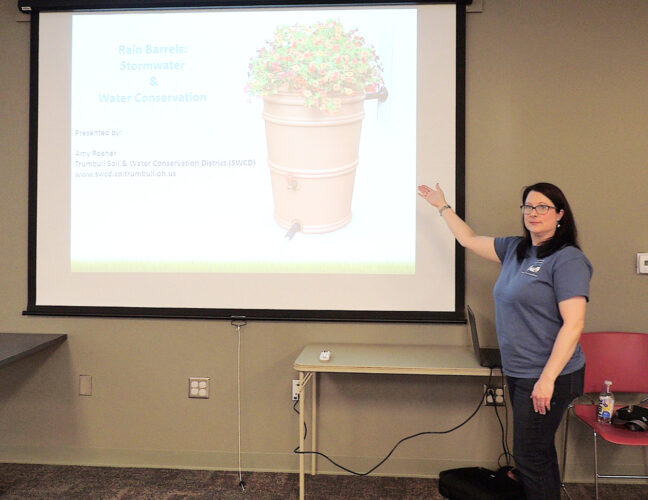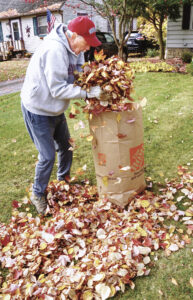Perfect talk for a rainy day

Correspondent photo / Nancilynn Gatta
Amy Reeher of Trumbull County Soil and Water Conservation District 11 points to her first slide showing a rain barrel during her talk, “Recycle the Rain: Tips & Tricks for Using Rain Barrels” on Saturday at the Brookfield branch of the Warren-Trumbull County Public Library.
“With all the rain we are having today, it would probably fill up a 55-gallon rain barrel,” Reeher said.
Rain barrels help collect water, which keeps watersheds healthy because they reduce stormwater runoff.
They also prevent water from pooling and creating puddles that contribute to flooding. They can be installed as a do-it-yourself project but kits also can be purchased.
She explained that a typical residential rain barrel holds approximately 55 gallons of rainwater, while commercial rain barrels can hold thousands of gallons.
A rain barrel is a free way to catch water that comes off your roof from your downspout that eventually will end up in your storm drain. They are often made of plastic, but can be made of other materials like wood.
Reeher discussed where to purchase a rain barrel, such as local home improvement stores, online and some local conservation districts sell them occasionally. Before installing a rain barrel, there are things to consider.
“You want to put it somewhere convenient to use it. You want to have the correct height for your diverter to have the rainwater go toward a garden or other area. Make sure the hole is not cut too low or too high. If too low , it will not fill, if it is too high water can overflow from the barrel,” Reeher said.
She also said the barrel should be elevated for better water pressure, but there are things to keep in mind when doing so.
“Do you have a homeowner’s association or you have an area in your yard that is very nicely landscaped and you don’t want to have four concrete blocks just sitting there. If you live out in the country on 10 acres, no one will care if you have concrete blocks. We at the conservation district are not going to say, ‘This is the best way.’ It is which way works best for you,” she said.
Rain barrels need some work to maintain them.
“You should inspect them regularly. You want to control the mosquito population. There are a variety of methods. Some people say to put a cap full of vegetable oil on top because it prevents them from laying their eggs. They get stuck in the oil and you can skim them out. You can also use mosquito dunks if you are not using the water to water vegetables, and just using it to water the lawn, wash your car or wash your dog if he is super muddy,” Reeher said.
There are issues to think about when deciding where to use the water that has been collected.
“You can use it in the garden for flowers and vegetables, too. What I would be concerned about is if you don’t know what your shingles are made out of or if some people get a treatment, they have mossy roofs and they get a chemical to prevent moss or fungus from growing. What is that chemical? Make sure you know what your source is. If you are not using it on crops, you don’t have to worry,” she said.
Also, the water in the rain barrel is not drinkable, potable water without treatment.
Reeher gave tips on extending the life of the barrel such as clear coating to prevent it from yellowing and becoming brittle and possibly bringing it inside your garage during winter’s frigid temperatures and wind.
Trumbull County Soil and Water Conservation District 11 has handouts and staff to answer your questions about rain barrels, installation use and maintenance.

